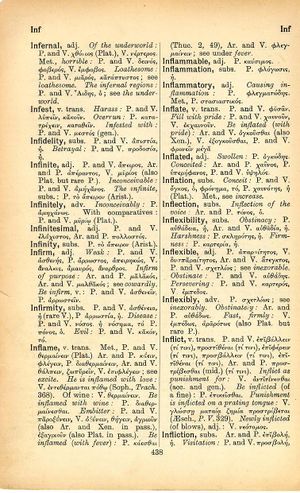infinite: Difference between revisions
From LSJ
ἐν οἰκίᾳ τυφλῶν καὶ ὁ νυκτάλωψ ὀξυδερκής → even the day-blind is sharp-eyed in a blind house | among the blind, the one-eyed man is king
(6_8) |
(D_5) |
||
| Line 7: | Line 7: | ||
{{Lewis | {{Lewis | ||
|lshtext=<b>infīnītē</b>: adv., v. [[infinitus]]. | |lshtext=<b>infīnītē</b>: adv., v. [[infinitus]]. | ||
}} | |||
{{Gaffiot | |||
|gf=<b>īnfīnītē</b>¹⁶ ([[infinitus]]), sans fin, sans limite, à l’infini : Cic. Or. 228 ; Ac. 1, 27 || d’une manière indéfinie, en général : Cic. de Or. 2, 66 ; Gell. 14, 7, 9. | |||
}} | }} | ||
Revision as of 06:56, 14 August 2017
English > Greek (Woodhouse)
adj.
P. and V. ἄπειρος, Ar. and P. ἀπέραντος, V. μυρίος (also Plat. but rare P.). Inconceivable: P. and V. ἀμήχανος. The infinite, subs.: P. τὸ ἄπειρον (Arist.).
Latin > English (Lewis & Short)
infīnītē: adv., v. infinitus.
Latin > French (Gaffiot 2016)
īnfīnītē¹⁶ (infinitus), sans fin, sans limite, à l’infini : Cic. Or. 228 ; Ac. 1, 27

